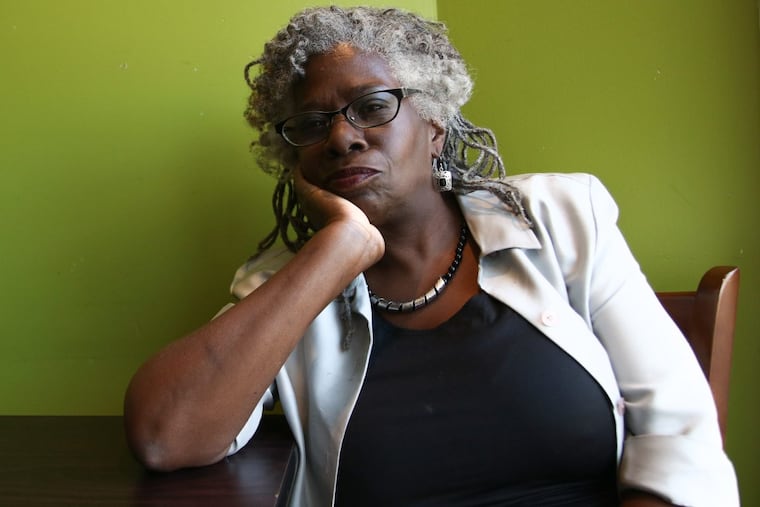Chef Valerie Erwin's new mission, at Eat Cafe
"The cafe is kind of like an on-the-ground, help-an-individual-person enterprise," says Valerie Erwin, the general manager.

Since the early 2015 closing of Geechee Girl Cafe, chef Valerie Erwin has been cobbling together a work life — catering jobs with Aliza Green at Material Culture, chef's demos, volunteer work with the Free Library's Edible Alphabet, an occasional pop-up appearance to cook Geechee Girl's famous fried chicken (which her sister Alethia cooks even better).
Then Erwin ran into Jeff Benjamin of Vetri Family. Among the restaurant group's charitable projects is Eat Cafe (3820 Lancaster Ave.), a West Philadelphia restaurant that allows customers to pay what they can. Drexel's Center for Hunger-Free Communities and Drexel's Center for Hospitality & Sport Management founded Eat, as well.
Donnell Jones-Craven, Eat's original chef and general manager, had left. Benjamin called Erwin and asked if she was interested.
In April, she took the general manager's job — but not the chef's role. That went to Margie Felton, a veteran caterer. "I hit the chef jackpot," Erwin says. "I can work on the menu and that kind of thing, but I don't have to turn out dinners every night. I have this great person who does, and who collaborates with me and who brings her own culinary sensibility to the restaurant." Eat serves dinner Wednesday, Thursday, and Friday, as well as Sunday brunch. Eat also raised $4,000 through a Thanksgiving drive, of which $2,500 will be used to provide about 120 meals for local families.
Last week, I chatted with Erwin, 64, whose pre-Geechee Girl background includes landmark restaurants such as the Commissary, La Terrasse, Roller's, and Striped Bass. (She says she opened Geechee Girl "primarily because I ran out of people I wanted to work for. I was looking for a certain attitude toward cooking and I just didn't think it existed.")
Why did you take the job at Eat?
What I tell people is, 'There's lots of work in food and justice but there's not lots of paid work.' So it is a really good platform. I love the cafe, and we are part of a bigger organization that was started by Dr. Mariana Chilton. She's the one who came up with the vision for the cafe and funding and the partners. She's really a visionary person and heads a research group called the Center for Hunger-Free Communities. The cafe is kind of like an on-the-ground, help-an-individual-person enterprise, and it does a very good job of that, but what the center does is research and policy and lobbying — trying to do the things that will either help people get out of poverty or prevent them from falling into poverty. I find that really, really interesting.
I'm not as interested in looking at someone who's falling through all the cracks in our society and saying, 'Let's give them a meal and that's the end of it.' We've got to do something else. We have got to change something, and that's the work that Mariana does.
How do you fit into this?
I do something a lot less rarefied. I really just run a restaurant. I admire the scholars who can do all those other things. It's OK when you can run a restaurant, but fundamentally, this is just a restaurant, and that's my role. That's what I really wanted to do — to enhance the food, enhance the service, to enhance the experience.
Tell me your earliest cooking memory.
I learned to cook from my father, and I don't remember learning. I don't remember a time when I couldn't cook. I mean, I remember learning how to make certain things, but I don't remember like not being able to cook dinner. My oldest cooking memory, though, is when I was 8. My next-door neighbor's mother was in the hospital, having had a baby, and I remember when my father came home and I said, 'Carolyn [age 9] came over because she was making dinner and she didn't know how to make gravy.' And my father said, 'So did you tell her?' And I said, 'Yeah.' I was 8 and I knew how to make gravy, so that's the only real marker that I have.
Do you serve fried chicken now?
I haven't done fried chicken, but that doesn't mean we're not going to. I have been thinking about it. I always think about what kind of revenue-generating things can we do, because this is an expensive model to support. We absolutely get support from our diners who come and give donations, but it's still an expensive model to support. We have funders, but I'd like to able to do other things where we can bring in money. I do think of doing something like fried chicken in a way where it would be a set price. It wouldn't be pay-what-you-can, and we would do it on a night where we're not normally open, like a pop-up.
A colleague wrote not too long ago that Eat needs more love. What's the immediate challenge?
It's a really beautiful, nice restaurant, and we're looking for more customers of every sort. We're looking for more people who come and get subsidized meals, because that's who we're there for. We want them to know about us, and I kind of feel like the more people that know about you, you're going to get more customers across the board. We're particularly interested in people who can come and who have other options to eat but who will come to Eat Cafe to eat because it's really nice. It has an open kitchen, beautiful colors, lovely lighting — so lovely that I have to get an electrician to change a light bulb, and I mean that literally. I can't change them myself.